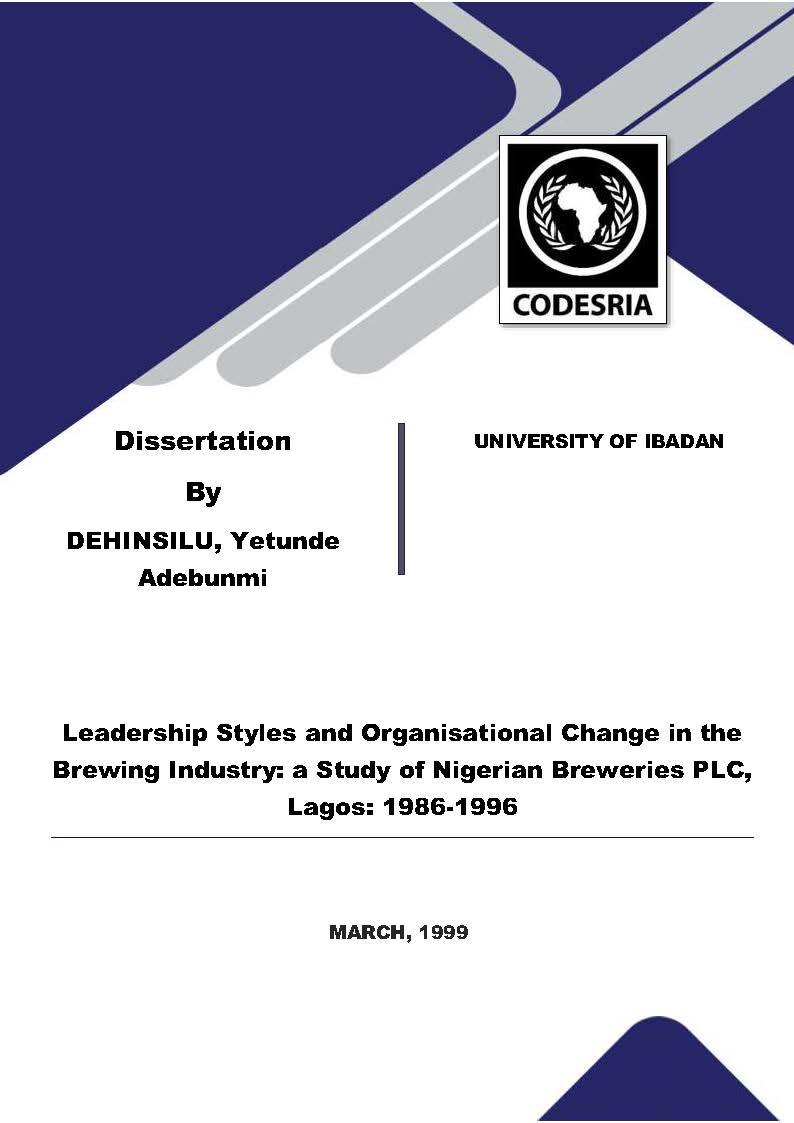Leadership Styles and Organisational Change in the Brewing Industry: a Study of Nigerian Breweries PLC, Lagos: 1986-1996
Mots-clés :
Leadership,, organisational change,, brewery, beverage industry,, NigeriaSynopsis
Leadership is a complex phenomenon. It is acutely context sensitive. Leadership is the process of
influencing individuals or group activities towards the achievement of enterprise objectives. So,
it represents the ability of a manager to influence subordinates' to willingly perform specific
tasks associated with the goal accomplishment.
The successful organisations have one major attribute that sets them apart from unsuccessful ones;
dynamic and effective leadership. Organisations need to change and adapt in order to be effective.
lt is increasingly apparent to all that organisational change is a requisite for organisational
improvement, and that managed change is likely to be more effective than unmanaged change.
Directly flowing from this problem therefore are a number of questions relating to the effects of
leadership style on organisational change in industry. We therefore attempted in this study to
answer some ofthese questions.
lt was found in this study that leadership style does in fact influence change in organisations in
terms of how the change is managed. This change though may be infrequent but could be
revolutionary in nature. Consequently leadership is very important in times of organisational
crisis. lt was revealed in this study that the qualities that will enable the top executive of the
füture to stand out among his/her fellow presidents are his/her capacity to perceive meaningful
change and inspire his/her people to respond, and his/her skill in fostering participative
management without losing drive
and spirit in his/her
Téléchargements
Références
Aldrich, HE, and Preffer, J (1976). "Environments of Organisations". Annual Review
ofSociology, vol 2 Palo Alto, C.A: Annual Review.
Allen, M.P, and Sharon, KP (1982). "Power, Performance, and Succession in the Large
Corporation". Administrative Science Quarterly. 27 (December), 538 -47. Ather, R.F, and Plunkett,
W.R (1994). Introduction to Management; Washington
Publishing Company . Belmont, California.
Barto KM, and Martin, D.C (1991). Management, McGraw- IDll. Inc. U.S.
Bass, B.M (1975). Leadership, Psychology and Organisational Behaviour: West Port, Connecticut,
Greenwood Press Publishers.
---,---- (1985). Leadership and Performance Beyond Expectations. New York ;
Free Press.
Becker, S.W, and Neuhauser, D (1975). The Efficient Organisation. New York :
Elsevier.
Benson, J.K (1975). 'The Interlocking Network as a PolitièaIEconomy".
Administrative Science Quarterly, 20, No. 2 (JUne), 229-49
Berrien, F.K (1976). A general Systems approach to organisations. In Handbookof
lndustrial and Organisational Psychology, ed. by M.D Donnette, 41 - 62. Chicago: Rand McNally.
Bobbit Jnr, et. al (1978). Organisational Behaviour: Understanding and Prediction;,
Practice Hall, Inc. Englewood cliffs, N. Jersey:
Bowman, C. (1987). Management: Management :in Practice Stage 2: Butteiworth &
Heinemann, London.
Braverman, H. (1974). Labour and Monopoly Capital: The Degradation ofWork in the Twentieth Century New York : Monthly Review Press.
Chandler, AD., Jr (1962). Strategy and Structure: Chapters in the histozy of the industrial enterprise. Cambridge, M.A :l.1IT Press.
Child, J. (1972). Organisational Stmcture, Environ.ment, and Performance : The Role of Strategic Choice". Sociology, 6, No. l (January). pp1 - 22.
Cohen, M.D. et. al (1972) "A Garbage can Model ofOrganisatioanal Choice".Administrative Science Quarterly, 17, No.l (March), 1 - 25.
Day, D.V., and RG. Lord, (1988). Executive leadership and organisational performance: suggestions
for a new theory and methodology. Journal ofManagement 14: 11 - 22.
DiM.aggio, P.J, and W.W.Powell(l983). "The Iron Cage Revised: Institutional Isomorphism and
Collective Rationality in Organisational Fields". American Sociological Review, 48 (April), 147 - 60.
Donnelly et. al. (1987). Fundamentals of Management (6th ed) Business publications,
Inc. U.S.A
Dosi, G. (1990). Technical Change and Industrial Transformation: The Theory And AnApplication to the Semi Conductor Industzy: Macmillian, London. Drazin, R, and AH Van de Ven (1985). "Alternative Forms of Fit in Contingency
Theory". Administrative Science Ouarterly, 30, No.4 (December), 514 -39,






